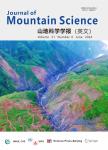Stakeholder Perspectives on Use,Trade,and Conservation of Medicinal Plants in the Rasuwa District of Central Nepal
Stakeholder Perspectives on Use,Trade,and Conservation of Medicinal Plants in the Rasuwa District of Central Nepal作者机构:Human Ecology DepartmentVrije Universiteit BrusselLaarbeeklaan 109B-1090 BrusselsBelgium Canada Research Chair in Aboriginal ForestryUniversité du Québec en Abitibi-Témiscamingue445Boulevard de l'UniversitéRouyn-NorandaQuébecJ9X 5E4Canada Kunming Institute of BotanyChinese Academy of Sciences Central Department of BotanyTribhuvan University
出 版 物:《Journal of Mountain Science》 (山地科学学报(英文))
年 卷 期:2011年第8卷第1期
页 面:75-86页
核心收录:
学科分类:1008[医学-中药学(可授医学、理学学位)] 10[医学]
基 金:VLIR of Belgium
主 题:Medicinal plants Livelihood improvement Income generation Himalaya Local people Conservation Policy
摘 要:People s livelihood in several Himalayan regions largely depends on collection,use,and trade of medicinal *** use is generally not a problem,but commercial gathering of selected species to meet increasing national and international demand can result in *** management of medicinal plants requires a clear understanding of the respective roles,responsibilities and viewpoints of the various stakeholders *** personal interviews and group discussions,this study aimed at investigating the views of two stakeholder groups on use,trade and conservation of medicinal plants in the Rasuwa district of *** people and district and national organizations agreed that medicinal plants are collected for a combination of commercial and personal *** on market availability differed significantly:100 % of the respondents from district and national organizations saw markets as easily available,against only 36 % for local *** could explain why medicinal plants were perceived by local people to contribute less to income generation than to livelihood *** viewpoints were also expressed concerning the status of medicinal plants in the district:81 % of the respondents from district and national organizationsconsidered that medicinal plants were threatened,compared to only 28 % for local *** this disparity,both stakeholder groups agreed upon potential threats to medicinal plants:over-harvesting;habitat loss due to land-use change and deforestation;and over-grazing by *** challenges were identified regarding sustainable management of medicinal plants,such as ambiguous policies;lack of resources,information and infrastructures;habitat degradation;and *** these challenges,respondents agreed that the medicinal plants sector offers huge opportunities in the Rasuwa district,given resource availability,community awareness and motivation,and the priority given



